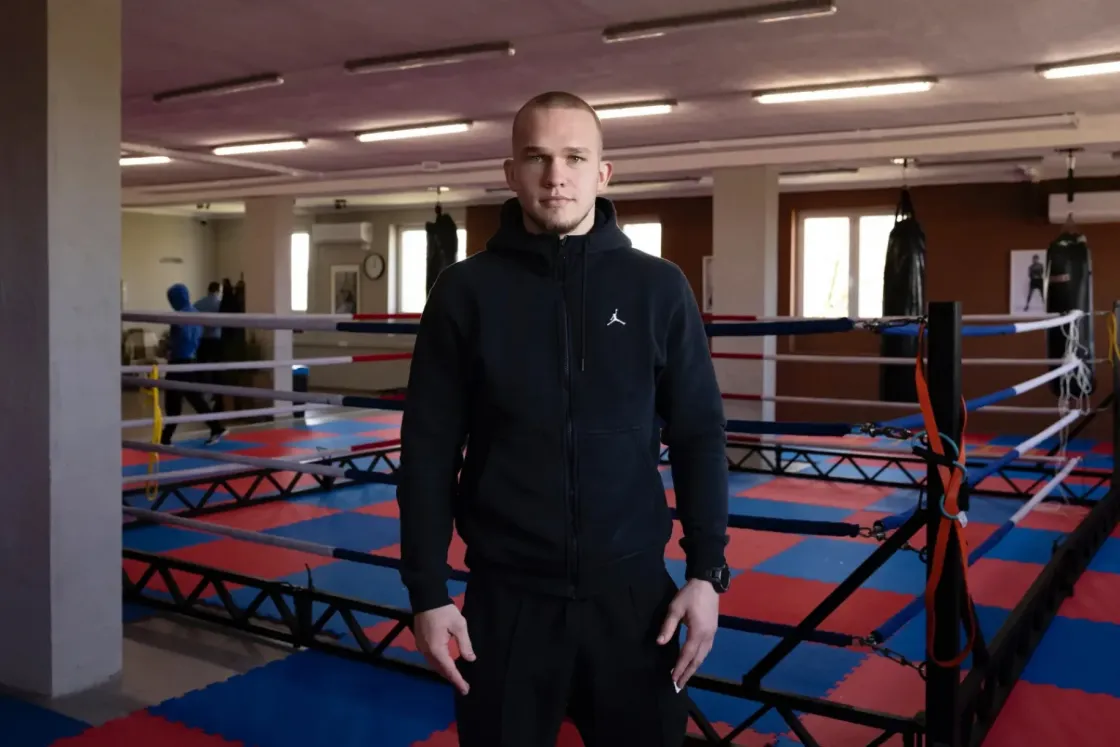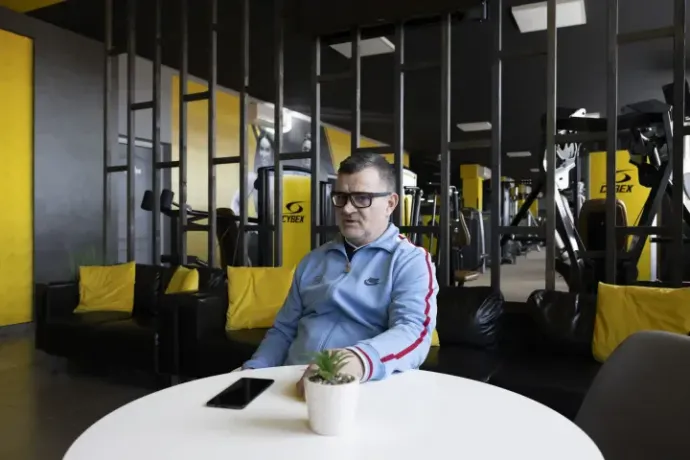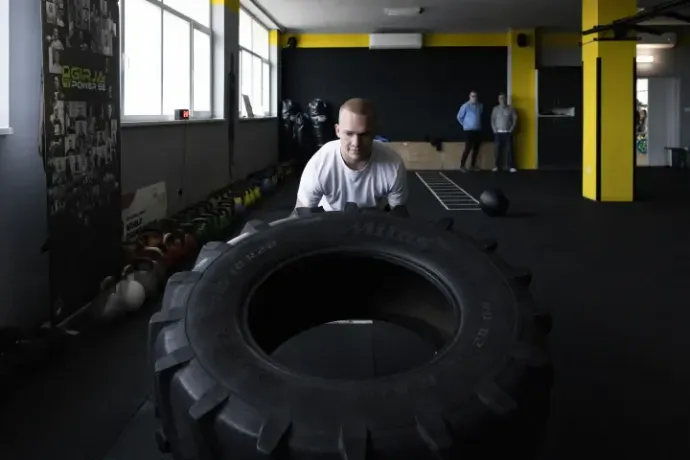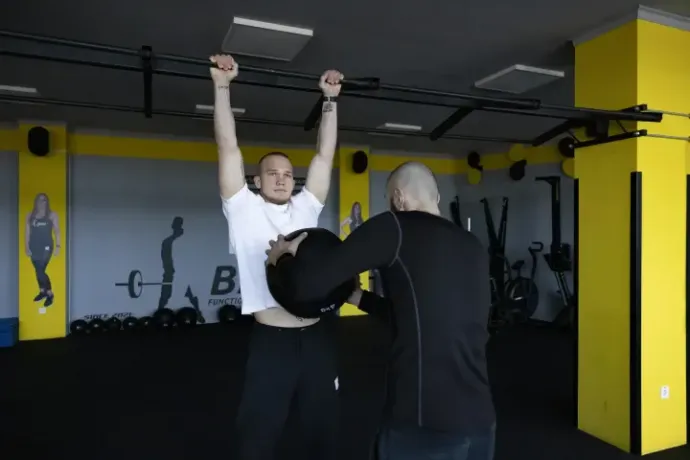
“We started over from scratch here two years ago. I would like to live here, my family lives here too, and I feel Hungarian.”
– Filip Akilov, born in Soledar, Ukraine, began our conversation in Hódmezővásárhely. In his Hungarian passport, he is identified as Akilov Pylyp. The 24-year-old boxer made it to the last eight at last year's World Championships, a feat which no Hungarian competitor has achieved in ten years. And at this year's qualification tournament in Italy, he earned the right to qualify for the Paris Olympics.
Akilov originally weighed 75 kilograms, but as that weight class is not included in the Olympics, he had to move up one level. That doesn't mean he can eat whatever he wants – although he quickly took a liking to Hungarian fish soup and pörkölt, while soljanka soup also remains a favourite – but he doesn't have to watch his weight every day. He's trying to work his way into the category, and there's still room for a few more kilos of muscle. By and large, he is familiar with his competition, but he is not looking in detail at who his opponents might be, because he is primarily focused on himself, and his goal is clear: to win the Olympics.
It says a lot about the quality of Ukrainian boxing, or more precisely the former Ukrainian workshops, that seven of their competitors qualified for the 2012 Olympics, five of whom returned from London with medals, with Oleksandr Usyk and Vasyly Lomachenko having since gone on to have huge careers in the professional ranks and becoming world famous. At the last Olympics, Aleksandr Khiznyak was on the brink of winning the gold. He was leading against his Brazilian opponent, but with 20 seconds to go he stepped into a punch and had to settle for the silver. Akilov was in the same training group as Khizhnyak when preparing for the Olympics, because they both weigh 75 kilos. He fought big battles against him, but felt he would never beat him, sensing that his opponent was getting more help than warranted.
"I didn't become a boxer because I was the type of kid who always got into fights. I see boxing as an art. Boxing itself is like life, a never-ending fight.
he says. – I won a championship in Ukraine when I was 12 years old, and the last title I won was in the university championship. I was able to enter there because I was attending a coaching school. Then the war started and suddenly everything changed."
Akilov was in Mariupol when the Russian tanks started moving towards Kyiv. His parents lived in Bakhmut. For three and a half weeks they knew very little about each other. When the Russians opened a corridor towards Belgorod, the athlete took advantage of it and crossed into Russia and from there into Belarus. In the meantime, with the help of a colleague, he got in touch with Csaba Cserényi, a coach from Hódmezővásárhely. He sent him a video of him boxing and told him in his own words that he wanted to become an Olympic champion. The Eiffel Tower in Paris is beautiful, but he is more interested in the gold medal and wants to give it his all.
Cserényi was impressed by the recording, his skills, his character, his faith, his charisma, his attitude, and went to pick him up. They arranged to meet in Poland. Akilov crossed the Polish border at Brest and headed towards Slovakia. He went to the border town of Białka Tatrzańska, sent a photo of himself to Cserényi before his phone died and waited for the coach.
“I saw a tobacconist's shop called "Żabka” in the photo. I thought there was only one in the town, but there were about ten of them. I searched and searched and it took me two hours to find it. It was heartbreaking to see this young man with a medium-sized sports bag standing in the cold in the middle of nowhere. I gave him a blanket, some warm tea and we set off for Hungary. I didn't know him, I only knew his friend Maksim. He had been here with us in the summer of 2021 when we invited the U22 Ukrainian national team to play a few matches, so we could learn from them, because there is no shame in learning from someone better than you.
Filip settled in quickly in Vásárhely, the first Hungarian word he learned was "jobbegyenes" (right jab). He has been hitting it ever since" – the coach of Fight Club VSE, Csaba Cserényi shared. The club works closely with the Halker Team in Csepel, which comes in handy when it comes to training for competitions.

Akilov is learning Hungarian and was granted citizenship in the summer of 2023. He now understands most of what is said to him, but still finds it hard to answer. When he participated in the national team's training camp, he quickly picked up more words and started answering nicely – even though not in full sentences yet. Plus, at the local club, he was able to constantly train with Pál Kovács, who was Hungarian champion and ninth in the world championship. The basic language of his training is Hungarian, which they supplement with English during the workouts with coach Mátyás Bagi. In the summer of 2022, as his form kept improving, during a training session one day he was a mere shadow of his former self. Cserényi noticed that he was not nearly as focused as before, that he kept losing focus. He went up to him and asked him what was wrong.
Boom, bomb, bomb
That's all Akilov said, all he managed to get out. It turned out that the house he grew up in had been hit by a bomb in Bakhmut. If his parents had arrived home half a minute earlier, they would have been dead. They were lucky they were not in the house when it was hit. All this happened in late June, before the Russians launched their long offensive against the city. The missile that destroyed their house was a stray one. Cserényi offered to help his parents come to Hungary and to pick them up at the border. They packed up what they had left into two shopping bags – which was all that didn't burn up in the fire – and reached the Hungarian border three days later. They brought their two dogs with them too. One of the dogs gave birth to four puppies along the way, so she snarled at the border control officers, but didn't hurt them, she only bit Cserényi.
When they arrived in Hódmezővásárhely, the coach sent a photo to Filip, who was already in Germany preparing for the Bundesliga final. Once Akilov had been reassured that his parents were safe, he demolished his opponent and beat him very easily, contributing to another championship title for the Traktor Schwerin boxing club, a historic triple.
Akilov doesn't like to talk about the trauma his parents experienced, his voice broke when we brought up the past. His mother was shell shocked, his father's back was injured and he needed to have several shrapnel pieces removed. Today, both have found work in Hódmezővásárhely: his mother works in a gardening business and his father in construction.
He beat the Georgian Garabadze in the first round of the World Championships and then the world number one, the Italian Cavallaro, in the second. He was better than him by a unanimous score, the Italian simply couldn't handle his style. In the draw of the last eight he faced Abdullayev, who was competing on home soil. Although Akilov felt he had the upper hand in two rounds, his opponent was still declared as better (5-0). In the end, Abdullayev won the bronze and Akilov ended up being fifth. The newly-formed International Boxing Association (IBA) awarded $50,000 to all fighters who made the final four. Akilov lost out on at least 17 million forints due to what he believes was a biased scoring. And that's not counting the Hungarian state allowances, which are a fraction of that, but also worth millions (in forints – TN).
"You know, I would have liked a fair result when I was out there at the world championships in Tashkent, boxing against the Uzbek, because then I could have bought my parents a house here with the prize money. It's for them too that I fight.
But they still got my prize money, I only bought myself a pair of shoes. I collect them and wanted to treat myself to a pair," he said.
Prior to the Tokyo Olympics, the International Olympic Committee (IOC) took over the organisation of the competition from the previous international federation (AIBA) because they felt that the judging in Rio in 2016 was so biased that it compromised the fairness of the competition. And indeed, there were no pre-determined results in Tokyo, and fair play prevailed, which gives Akilov a great chance in Paris, given that his skills could well make him a medalist. Moreover, the limited number of competitors at the Olympics means that it is enough to beat three opponents to win a medal.
The setback in Tashkent did not discourage him, but spurred him on to work even harder. He prepared fanatically for the world qualifiers in Italy held at the beginning of March. He beat his Welsh opponent Taylor easily in the first round, then overcame Austria's Aimufua in the second, and had a somewhat tougher time against Gedmunas of Norway, but the real prize was Gradus Kraus of the Netherlands, whose record included beating the Cuban Olympic champion Arlen Lopez once.
"It wasn't a pretty match, the Dutchman used all kinds of tricks. He didn't just use his fists, but his elbows too and he even held me down a couple of times. But I was better in the first two rounds and that made my dream come true. I even cried a little bit." I asked him if he had a little vodka afterwards, but he looked at me stunned, so that I regretted even asking the trivial question. "I never drink," he declared. He didn't even have a toast with his family when he got home.
“My head is my strength, it must always remain clear. I'm not weak, there's strength in me, but I'm more of a counter attacker. You have to notice the opportunity and the distance and strike back. You have to be able to use your strength well. My idol is the American legend Roy Jones. I know he didn't win an Olympic gold, he was cheated out of it in 1988, but what he did in the pros is unmatched. Maybe I can win the Olympics. I still have a lot of work to do until then, I'm still going to have some training camps abroad. There's not a day that goes by that I don't think about the five hoops. I will be fighting for myself, my parents and Hungary in Paris.”


After consultating with the Hungarian team captain, the Uzbek Hamid Tangirbergenov, they decided that Akilov will stay away from the European Championships in Belgrade, which will start on 15 April, and is only focusing on the Olympics. He and his coach have started a macro-cycle, focusing on physical work. In the coming months, he will almost certainly train with Kazakh and Uzbek boxers, and then the Olympics will be next.
"We built a good relationship with the Ukrainians before. First we went to Lviv to learn from them, then to Melnyitsky and Kharkiv. We thoroughly explored what they do differently. We became “druzhba” (friends -TN). We didn't get to visit the school where Filip came from because of the war. But I knew what kind of education they were getting. Even in the Soviet era, Donbass was a renowned workshop. They focused on footwork, but if you were into offensive fighting, they didn't hold you back. Filip was made for the counter-attack, it suits him better. And I'm trying to hone his skills, his accuracy.
There are still many young talents out there who have indicated that they would like to come. Filip didn't take away any Hungarian's spot at the Olympics, but we can see how he inspires those around him. We obviously can't accommodate everyone. I know that people are attacking us for this, but it's only the beginning. In the sixties, Vásárhely was famous for its boxing, my cousin used to coach here. Now, we want to keep raising the bar higher and higher instead of lowering it. When the train is moving, one shouldn't look for the emergency brake, but should try to make it go faster instead. “Let the sluggards suffer”, as the saying goes.
Filip is aware that as a Hungarian competitor he has to deliver twice as much in the ring for the judges, but he doesn't mind it, he is proud to accept the challenge."
– Csaba Cserényi said in conclusion.
The author wishes to express his thanks to Katalin Cserényi for her translation help.
For more quick, accurate and impartial news from and about Hungary, subscribe to the Telex English newsletter!